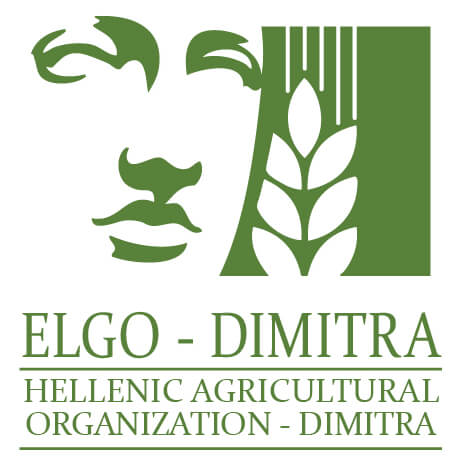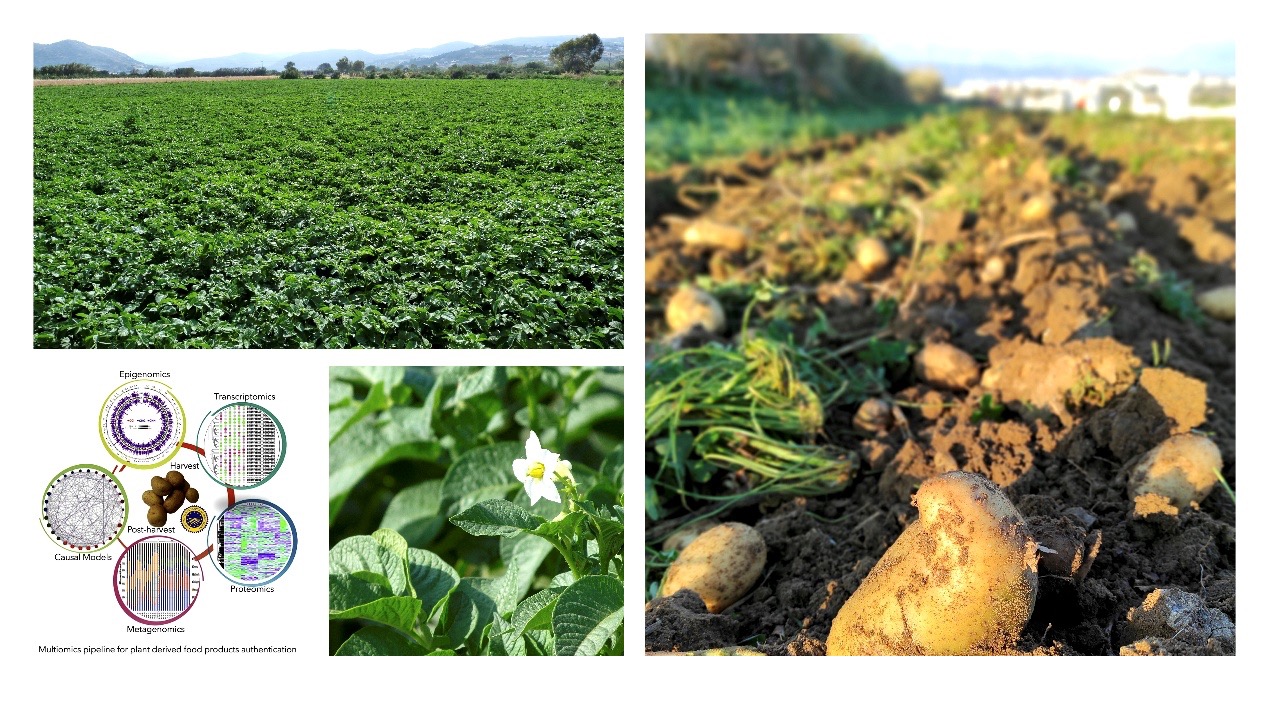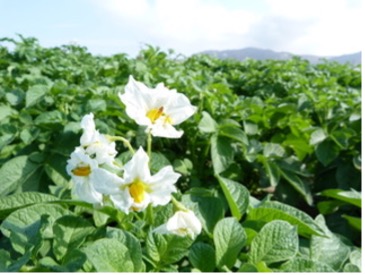
AGRICULTURAL RESEARCH

Researchers from the Institute of Plant Breeding and Genetic Resources of ELGO-DIMITRA are decoding the unique secrets of Naxos potatoes.

“This comes from an exceptional terroir” is a phrase often heard from food and wine connoisseurs. However, the exact meaning of “terroir” is often left undefined. Originating from the French word “terre” (meaning soil), terroir is a term that does not have a direct translation into other languages. In a broad sense, it signifies the combination of aboveground and underground environmental characteristics of a specific geographical area that make an agricultural product unique.
Soil, subsoil, slope, orientation, climate, microclimate, and specific crop varieties cultivated in a particular region are just some of the factors that compose the terroir, provided that they contribute to the production of high-quality products with a distinctive character. This unique and complex interplay of environmental, genetic, and agricultural factors not only defines the stamp but also shapes the sensory experience of a product.
Terroir is the foundation of the French wine appellation system, which has served as a model worldwide. However, its application is increasingly discussed in the broader food industry. “Today, geographical indications ensure the quality of plant-based foods linked to a specific terroir and are generally regarded as indicators of superior organoleptic and phytochemical properties. Given the complex dynamics of agricultural ecosystems, due to various interactions between plants, microorganisms, and the environment, identifying the molecular footprint associated with terroir remains a major challenge for safeguarding both product origin and food safety," explains Dr. Ioannis Ganopoulos, a researcher at the Institute of Plant Breeding and Genetic Resources of ELGO-DIMITRA. He also highlights that the contribution of the microbiome to the terroir footprint has been largely underestimated.
The Power of Omics Technologies
A groundbreaking study conducted exclusively by a team of Greek scientists from multiple institutions—including the Institutes of Plant Breeding and Genetic Resources and Soil and Water Resources of ELGO-DIMITRA, the Departments of Agriculture and Informatics of the Aristotle University of Thessaloniki, and the Biomedical Sciences Research Center "Alexander Fleming"—leveraged the full potential of omics technologies (the suffix "-omics" denotes the study of a group of molecules with similar characteristics) to certify popular agricultural products, primarily Naxos potatoes.
The research followed a food analysis approach known as "foodomics," which integrates food and nutrition science with the latest advances in analytical chemistry, omics technologies, bioinformatics, chemometrics, and machine learning.
"Advanced omics technologies include genomics, which studies the entirety of an organism’s genes and their functions; transcriptomics, which examines the complete set of transcripts (mRNA) produced in a cell or organism; proteomics, which analyzes the full range of proteins and peptides encoded by an organism’s genome; and metabolomics, which investigates the composition, dynamics, and interactions of metabolites in cells, tissues, and biological fluids in response to environmental changes," Dr. Ganopoulos describes.
Through this research approach, scientists go beyond merely detecting and identifying components of various samples. They tackle the challenge of holistically mapping a food product’s profile using cutting-edge multidimensional analysis techniques, meeting the demands of sustainable development and green, eco-friendly production. The study’s innovation lies in the combination of traditional “Foodomics” tools with microbial analysis of terroir.
"Given globalization and the numerous technological advances and innovations shaping the food market, consumer expectations regarding the reliability of food labeling have risen significantly. Consequently, the food industry and governments must establish valid analytical methods and regulatory frameworks to certify food products and ensure this reliability. In recent decades, numerous food fraud incidents have confused the market, highlighting the need for mechanisms to prevent food fraud and safeguard product identity. While food fraud is often linked to price manipulation, in some cases, it also involves hazardous ingredients and allergens," the researcher of ELGO-DIMITRA.
Products with Protected Designation of Origin (PDO)
According to Dr. Ganopoulos, a significant challenge in food research is the accuracy of labeling, particularly for products with Protected Designation of Origin (PDO) or Protected Geographical Indication (PGI), as defined by the EU’s geographical indication system for food quality. "These food quality labels can serve as valuable tools for protecting genetic resources, supporting sustainable agricultural development, and adding value to foods through differentiation based on organoleptic properties and traditional 'know-how' practices. As a result, there is a growing demand among EU agricultural producers to differentiate and certify their products to enhance their competitiveness in the global market," he says.

Potatoes (Solanum tuberosum L.), for example, are a fundamental staple in human nutrition, especially in addressing the dietary needs of an ever-growing population. Today, potatoes remain one of the most popular and essential crops, playing a key role in global food security. According to the Plant Production and Protection Division of FAO (2009), an estimated two billion people worldwide are closely linked to potato cultivation for nutritional or economic reasons, earning the tuber the title of "Food of the Future."
Modern technologies for identifying agri-food products, such as DNA barcoding and molecular markers, can distinguish plant varieties/species but cannot determine a product’s geographical origin. "Unfortunately, food fraudsters, such as those mislabeling products or engaging in food adulteration, are often one step ahead of regulatory authorities. For example, a Greek variety with geographical protection status can be grown in another region or country. These products cannot be differentiated from genuine ones carrying geographical indications solely based on DNA, as they share the same genetic material. Therefore, holistic approaches combining various modern tools and technologies are necessary," Dr. Ganopoulos emphasizes.
Researchers at the Institute of Plant Breeding and Genetic Resources of ELGO-DIMITRA have recently developed a combined methodology that enables the detection of the molecular signature of PGI products. Using potatoes as a plant model, they presented a proof-of-principle study demonstrating the first multi-omic DNA methylation analysis across the genome, RNA sequencing, and protein profiling to establish the molecular profile of the renowned PGI potatoes of Naxos at harvest and after storage. They also applied a metagenomic approach to distinguish potato tubers produced in different regions based on their distinct microbial fingerprint, correlating it for the first time with large-scale omics datasets of potato tubers—effectively integrating data across the entire "holo-biome." Similar technologies and methodologies can be applied to numerous agri-food products for both traceability and certification purposes.
"Creating food quality labels using these advanced technologies and methodologies can serve as a valuable tool for protecting genetic resources, supporting sustainable agricultural development, and adding value to foods through differentiation based on organoleptic properties and traditional 'know-how' practices. In this context, there is a growing demand among EU agricultural producers to differentiate and certify their products to enhance their competitiveness in the global market," concludes the Greek researcher.
Information: Dr. Ioannis Ganopoulos, ELGO-DIMITRA, Related Institute: Institute of Plant Breeding and Genetic Resources, Thermi-Thessaloniki, iganopoulos@elgo.gr
Text: Vasso Michopoulou